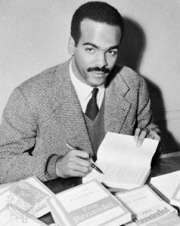|
プロファイル Édouard Glissant
Edouard Glissant (born in Sainte-Marie, Martinique in 1928) is a French writer, poet and literary critic. He is widely recognised as being one of the most influential figures in Caribbean thought and cultural commentary.
He studied at the Lycée Schoelcher, named after the abolitionist Victor Schoelcher, where the poet Aimé Césaire had studied and had come back to as a teacher. Césaire had met Léon Damas there; later in Paris they would join with Léopold Senghor, a poet and the future first president of Senegal, to formulate and promote the conecpt of négritude. Césaire did not teach Glissant, but did serve as an inspiration to him; another student at the school at that time was Franz Fanon.
Glissant left Martinique in 1946 for Paris, where he received his PhD, having studied ethnography at the Musée de l'Homme and History and philosophy at the Sorbonne. He established, with Paul Niger, the separatist Front Antillo-Guyanais pour l'Autonomie party in 1959, as a result of which Charles de Gaulle barred him from leaving France between 1961 and 1965. He returned to Martinique in 1965 and founded the Institut martiniquais d'études, as well as Acoma, a social sciences publication. He now divides his time between Martinique, Paris and New York, where he has been visiting professor of French Literature at CUNY since 1995. In January 2006, Édouard Glissant was asked by Jacques Chirac to take on the presidency of a new cultural centre devoted to the history of slave trade. An English translation of Chirac's speech can be found here
Shortlisted for the Nobel Prize in 1992, when Derek Walcott emerged as the recipient, Glissant is the pre-eminent critic of the Négritude school of Caribbean writing and father-figure for the subsequent Créolité group of writers which includes Patrick Chamoiseau and Raphaël Confiant. While his first novel portrays the political climate in 1940s Martinique, through the story of a group of young revolutionaries, his subsequent work focuses on questions of language, identity, space and history. Glissant's development of the notion of antillanité seeks to root Caribbean identity firmly within "the Other America" and springs from a critique of identity in previous schools of writing, specifically the work of Aimé Césaire, which looked to Africa for its principal source of identification. He is notable for his attempt to trace parallels between the history and culture of the Creole Caribbean and those of Latin America and the plantation culture of the American south, most obviously in his study of William Faulkner. Generally speaking, his thinking seeks to interrogate notions of centre, origin and linearity, embodied in his distinction between atavistic and composite cultures, which has influenced subsequent Martinican writers' trumpeting of hybridity as the bedrock of Caribbean identity and their "creolised" approach to textuality. As such he is both a key (though underrated) figure in postcolonial literature and criticism, but also he often pointed out that he was close to two French philosophers, Felix Guattari and Gilles Deleuze, and their theory of the rhizome.
Novels
La Lézarde. (1958) Nouvelle édition, Paris: Gallimard, 1997.
Le Quatrième Siècle. (1964) Paris: Gallimard, 1997.
Malemort. (1975). Nouvelle édition, Paris: Gallimard, 1997.
La Case du commandeur. (1981) Nouvelle édition, Paris: Galliamard, 1997.
Mahagony. (1987) Nouvelle édition, Paris: Gallimard, 1997.
Tout-Monde. Paris: Gallimard, 1993.
Sartorius: le roman des Batoutos. Paris: Gallimard, 1999.
Ormerod. Paris: Gallimard, 2003.
Poetry
La Terre inquiète. Lithographies de Wilfredo Lam. Paris: Éditions du Dragon, 1955.
Le Sel Noir. Paris: Seuil, 1960.
Les Indes, Un Champ d'îles, La Terre inquète. Paris: Seuil, 1965.
L'Intention poétique. (1969) (Poétique II) Nouvelle édition, Paris: Gallimard, 1997.
Boises; histoire naturelle d'une aridité. Fort-de-France: Acoma, 1979.
Le Sel noir; Le Sang rivé; Boises. Paris: Gallimard, 1983.
Pays rêvé, pays réel. Paris: Seuil, 1985.
Fastes. Toronto: Ed. du GREF, 1991.
Poèmes complets. (Le Sang rivé; Un Champ d'îles; La Terre inquiète; Les Indes; Le Sel noir; Boises; Pays rêvé, pays réel; Fastes; Les Grands chaos). Paris: Gallimard, 1994.
Le Monde incréé: Conte de ce que fut la Tragédie d'Askia; Parabole d'un Moulin de Martinique; La Folie Célat. Paris: Gallimard, 2000.
|





